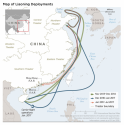Hendrik_2000
Lieutenant General
It is no problem to use kerosene in diesel engines or diesel in jet engines. Kerosene and diesel are quite the same. You can't use gasoline in diesel engines and only for a limited time in some jet engines (Beech King Air turboprop only 200 hours for example).
I don't think so Kerosene is a cut above diesel and burn cleaner I don't think they are interchangeable at least not in jet engine. You can use kerosene in diesel engine
The Diesel Family
In the diesel family we have things like Highway Diesel and the various grades of home heating oil.
For transportation purposes these fuels are used in compression-ignition engines ("diesel engines"), where a high temperature and pressure will cause the fuel to ignite and burn, producing power.
For other purposes (like heating) we basically light the stuff on fire and are happy it burns.
The Kerosene Family
The Kerosene family are close cousins of the Diesels, including K-1 and K-2 Kerosene (obviously) and Jet-A.
Jet-A is a high-purity kerosene based fuel manufactured under a specific ASTM standard (D1655), with specific physical properties, and is used in jet turbine engines. Fuel not meeting the Jet-A specification is generally recycled in the production chain for other purposes (for example it may be used in blending kerosene for heating, or blended into highway diesel).
Jet-A is suited for turbine engines, but can also be burned in other compression-ignition piston engines like diesel can (there are a wide variety of available from several manufacturers).
Other grades of Kerosene are used for motor fuels, cooking fuel ("camp stove fuel" is typically kerosene) heating, lighting, etc. depending on their refining and purity.




